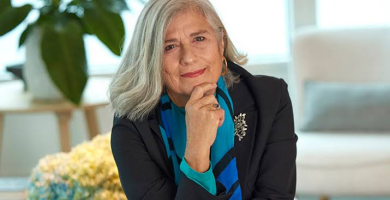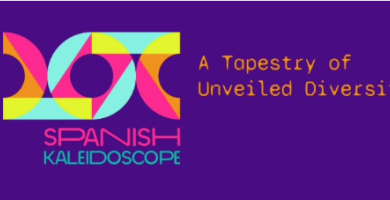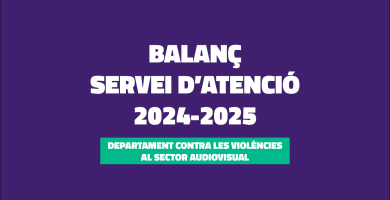
L'Alternativa: "It's not a joke when we say that the festival really makes the hidden visible."
We interviewed Tess Renaudo, head of the Official Section and Patricia Sánchez, head of the Professionals Section of L'Alternativa, Festival de Cinema Independent de Barcelona.

It has been 24 years since L'Alternativa was born. How did the idea of creating the festival arise? What was the spark that lit the fuse?
Tess Renaudo: It emerged from the need for a cozy and human space to discover a cinema that is usually invisible in a post-Olympic Barcelona. In essence, L'Alternativa remains the same as when it emerged: A unique platform for discovering and launching new authors. A place of meeting and celebration for movie lovers.
However, L'Alternativa has evolved to adapt itself to its context and to the new needs detected. From the absolute emptiness that existed in its beginnings, in terms of exhibition spaces of the most independent cinema, to continue working carefully to discover that cinema that still does not have the place it deserves, despite the new open windows. We defend creative freedom and diversity of views, reflections and ways of understanding the world.
L'Alternativa has become an increasingly participatory space, defending the active participation of citizens, professionals, students and children, the exchange between creators and the public, promoting creativity, reflexive and critical capacity of the citizens.
What values do you want to transmit from your beginnings and that are still there?
TR: The festival is a unique opportunity to know and enjoy projections and activities that stimulate appreciation for cinema, defending diversity and creativity. A coherent program with its own personality, essential to achieve a reference space in the international circuit. To be a discovery platform with a largely unprecedented programming in our country in defence of international cinematographic diversity. Organize activities that feed-back and respond to the needs and interests of different profiles: professionals, film students, public, family audience. To defend the active participation of citizens, professionals, students and children, the exchange between creators and the public, and promoting the creativity and reflexive and critical capacity of citizens. Last, but not least, create a warm and personalized service that facilitates personal and professional relationships and public loyalty.
During these years, what challenges did you have to face as a festival?
TR: To a very tight budget, followed by cuts on a very tight budget ...! Reinvent yourself to do the same or more, with less. Maintain an essential team, which evolves with the festival, despite economic precariousness.
Patricia Sánchez: The economic crisis was joined by the crisis of the cinematographic exhibition. Suddenly not so many years ago, the public had so much offer without leaving home and was so uncertain of what was going to happen with their jobs, that it was difficult to approach the screens we offered. The way of watching movies had changed considerably and almost suddenly, so we also had to change ourselves in the way we offered it. The fact that the country began its cuts in cultural investments also affected us. Not being a festival with a red carpet, but blue, black, green or purple, and not wanting to change its essence, made us live that same uncertainty that was affecting our audience.
L'Alternativa has always opted for a committed and independent cinema, how is this commitment reflected in the festival's programming? How are the films that are part of the official section chosen?
TR: Prior to selection there is an exhaustive investigation of recent international production. This gives way to a long, hot viewing summer, the selection team sees around 2000 films, between short and long films. An important part of the films comes from our open call, and another part arrives at the invitation of the festival. We watch a lot of films from all over the world, to create a broad, innovative program that shows the trends and evolution of independent cinema. We seek energy and creativity at the margins of the industry, drawing a path between the present and the past, between continents, and between the personal and the universal.
The official section also allows us, as programmers, to explore the synergies that exist in international cinema, films as mirrors and not as windows through which we evade what surrounds us. We put the emphasis on the representation of reality, always under the prism of filmmakers convinced of the creative power of the cinematographic language. We support those works and filmmakers who ignore gender rules, which lend themselves to representing the times they live, and this allows us to work with absolute freedom and coherence between theme and form.
Throughout your career, you have also strived to recover and make known all those authors or films created outside the commercial circuits. Do you think that today it is more difficult or easier to have access to this type of cinema with the changes that the Internet has brought, for example?
TR: Of course, it is easier to access today. If fiber optic arrives, the cinema can arrive, if you know how to find it and you know what you are looking for. Another thing is love the cinema as a shared experience, value the big screen and have the opportunity to discuss with authors after the screening.
But, however, if it were not for the collaboration we have with Filmin (already eight years ago), it would be almost impossible to find most of the films that we project in L'Alternativa online, legally or illegally. It’s not a joke when we say that L'Alternativa really makes the hidden visible.
PS: I think that over the years we have been able to adapt to the facilities provided by the internet. While it is true that there is a huge amount of information that you have to open up to highlight, it is also true that sharing movies to be viewed is cheaper and more ecological now that we can do without the traditional mail through which the filmmakers sent their works. In addition, there were born and grown platforms related to our criteria that offer the possibility of discovering a cinema that before you could only see if you go to endless festivals.
This year the professional day was about creating labels and brands. How marketing and the press use them, but also the need to describe certain film contents in order to be found. Not only the internet as a distribution tool, but also the technological democratization, made the audiovisual production increase, creating the need to classify the works so that "the user", as in any library, manages to reach what they are looking for. What can be of course a double-edged sword ...
As you said, you collaborate with Filmin offering part of your programming in this platform, how and why this collaboration started?
TR: It was born of the desire to expand access throughout the Spanish territory to the works discovered at the festival. Bring the cinema closer to those who do not live in Barcelona, places where there are no festivals or movie theaters that show art films in VO.
PS: In our desire to improve, grow and attract new audiences, we decided to approach the professional world of our sector, through generating a meeting. With this purpose, the Professionals section was born in 2010. It has the title "From home cinema: internet and independent film." Jaume Ripoll, co-founder of Filmin, was one of the three invited speakers. Filmin was the platform for all of us to bet on. It contained a cinema difficult to find on the screens and was an alternative to piracy. So, in that first meeting with Jaume, we proposed him to participate in the Professionals section, and we also proposed that collaboration so that our films could be seen days after the festival in Spain. And eight years later, we continue with it, extending L'Alternativa a few more days for all those who could not be present at the festival.
Does the independent or alternative movies made here have a good moment?
TR: Yes, there is a lot of creativity, freedom and possibility. The last decade has seen a certain democratization of cinema thanks to digital technology. The possibility of creating and exhibiting their work is available for many more people ... the costs are reduced and the ways of seeing the cinema have multiplied. This (r) evolution makes the visions expand, from the DIY cinema to the big productions. It allows more representations of the world and less hegemony, and as long as people remain restless and need to express themselves, the cinema will be an essential language.
The festival has also a part of parallel activities that are increasingly important. This year you celebrated the 8th edition of the meeting for professionals. Why do you think this kind of meetings are necessary and how do they help create more independent cinema?
PS: L'Alternativa Professionals is aimed at all film professionals in all its branches. It was born from the need to create a meeting between the sector, and not only for the creators of independent cinema. During the conference, recurrent themes for our cinema are discussed, but they are also interesting to more classic filmmakers or the ones that work with higher budgets. In addition, we try that the subjects attract not only directors and producers, but also distributors, exhibitors, programmers, managers and cultural journalists, audiovisual teachers, etc. This is how we create the meeting, which ends with a vermouth to continue debating tête à tête what everyone thinks of the exhibitions on the day. In addition, links between the cinematographic agents are very useful for the future.
And I think we're right, that first day in which we invited Jaume to discuss about Filmin, was an hour and a half and three speakers. Now, we have a large number of experts, that Jaume has in fact moderated several times. Eight years later it has become an essential meeting with 16 speakers and activities in parallel as pitchings, mentorings and other training activities for professionals.
How do you select the type of activities you offer to professionals?
PS: The selection of activities has to do with the moments that we lived in the times we started to organize these activities. Of the information needs that the professionals have, as well as of debates that are created in other meetings or meetings in which we are present. It also has a lot to do, once you start to delve into the subject, with the parallel sections that will be held that year at the festival, with the guests you can count on, the directors selected in the official section, etc.
From the idea that we have of what will next year, there will be many transformations because, in addition, in parallel to the organization of L'Alternativa, our work also takes us to relate to those needs and concerns that the sector is experiencing.
And this does not only happen with the Professionals sections but also with the pitchings, masterclass, parallel activities and even the workshops that we organize with the schools and to which more and more diverse public attend. They are very organic activities that almost until the moment of their execution are alive and open to their intervention with the present.
The festival has also expanded the space for the meeting and the active participation of the spectators. Do you think it is important to involve viewers not only in the act of watching movies but also in everything that surrounds them? And how do you propose parallel activities such as round tables, master classes, workshops to attract the public and offer a bonus to the cinematographic event itself?
TR: L'Alternativa has always worked to encourage access to the festival for anyone with an interest in cinema, language, culture - to curious people, wanting to discover unconventional representations of the world. We have been working for many years to facilitate public access, multiple spaces for training, debate and for active participation. We also weave networks with film schools, associations, film magazines and cultural projects, in order to give voice to plurality and share the proposals that arise in our city and beyond. In addition, both the parallel sections and the activities that accompany them - workshops, seminars or masterclasses - allow us to closely follow the trajectory and work of artists who have marked and now continue to score in contemporary cinema, and we think that they can contribute to the creative development of artists, filmmakers, local students.
And related to the above, is it more difficult to attract the viewer simply to watch movies now than a few years ago?
TR: Festivals allow us to experience a kind of film utopia for a week, with multiple projections, activities, meetings, debates and events in synergy and simultaneously. I think that the euphoria of participating in a festival and especially with the warmth and accessibility of L'Alternativa, makes the film audience that we defend grow.
PS: I think that festivals in general are the meeting to attend to watch movies "and something else". You know that you will meet friends, people you have not seen for a long time, colleagues of profession, etc., and that both before and after the screening, you can discover something more than L'Alternativa has arranged in its programming and that surely makes you discover an author, a theme, an initiative, etc., that you had not even imagined that it existed.
For some years now you have also included a whole series of activities and programming dedicated to children. Is it your way of bringing a different cinema closer to the little ones?
TR: Absolutely! Contribute to offer tools to be curious and critical spectators. The projections are accompanied by a series of family and collective workshops, which allow the creative process to be approached as well.
PS: It is also a way to bring children and parents to the festival that otherwise, they might not be able to come, although there are times that, due to the programming of the Hall, not necessarily childish, the space is filled with children running around the carpet while their parents enjoy some interesting pieces.
What do you think L'Alternativa brings as a festival to Barcelona and what does the city bring to you?
TR: We open doors and windows to representations of the world, and Barcelona, as a city of port and balconies, is a great hostess!
PS: Everyone wants to come to Barcelona so it is often the added value for which filmmakers and experts accept our invitation and we can have their presence at the festival.
What advice would you give to someone who wants to organize any type of event related to the independent culture?
TR: A commitment and an unconditional human dedication and believe that culture is an essential tool to question the status quo.
What is your assessment of your long career and especially this latest edition?
TR: We're on the right track! That we have to keep fighting and forging a path, although a steep one.
PS: It has been a week of happiness and gratitude. Well done work gives fruits and energy for the next edition.
What are the challenges of the future for L'Alternativa?
TR: Get out of economic precariousness, be able to breathe deeply, and make all the ideas we have to work in a team come true and bring works and filmmakers closer together and share it with the public.
PS: Yes. To be able to realize a lot of good ideas that we have in mind and that the public continues enjoying them.









